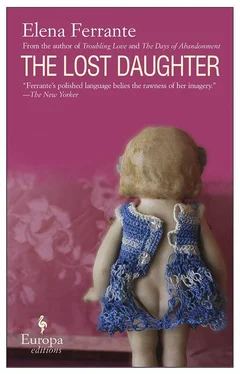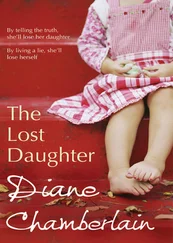Elena Ferrante - The Lost Daughter
Здесь есть возможность читать онлайн «Elena Ferrante - The Lost Daughter» весь текст электронной книги совершенно бесплатно (целиком полную версию без сокращений). В некоторых случаях можно слушать аудио, скачать через торрент в формате fb2 и присутствует краткое содержание. Год выпуска: 2008, Издательство: Europa Editions, Жанр: Современная проза, на английском языке. Описание произведения, (предисловие) а так же отзывы посетителей доступны на портале библиотеки ЛибКат.
- Название:The Lost Daughter
- Автор:
- Издательство:Europa Editions
- Жанр:
- Год:2008
- ISBN:нет данных
- Рейтинг книги:3 / 5. Голосов: 1
-
Избранное:Добавить в избранное
- Отзывы:
-
Ваша оценка:
- 60
- 1
- 2
- 3
- 4
- 5
The Lost Daughter: краткое содержание, описание и аннотация
Предлагаем к чтению аннотацию, описание, краткое содержание или предисловие (зависит от того, что написал сам автор книги «The Lost Daughter»). Если вы не нашли необходимую информацию о книге — напишите в комментариях, мы постараемся отыскать её.
,
is Elena Ferrante's most compelling and perceptive meditation on womanhood and motherhood yet. Leda, a middle-aged divorce, is alone for the first time in years when her daughters leave home to live with their father. Her initial, unexpected sense of liberty turns to ferocious introspection following a seemingly trivial occurrence. Ferrante's language is as finely tuned and intense as ever, and she treats her theme with a fierce, candid tenacity.
The Lost Daughter — читать онлайн бесплатно полную книгу (весь текст) целиком
Ниже представлен текст книги, разбитый по страницам. Система сохранения места последней прочитанной страницы, позволяет с удобством читать онлайн бесплатно книгу «The Lost Daughter», без необходимости каждый раз заново искать на чём Вы остановились. Поставьте закладку, и сможете в любой момент перейти на страницу, на которой закончили чтение.
Интервал:
Закладка:
At one point during the morning I saw that Tonino, Elena, and Nina were having ice cream in the bar at the beach house. I passed by to go to the counter and order a coffee, but it seemed to me that they didn’t even see me, they were too taken up by the child. Yet, when I was about to pay, the manager told me that I owed nothing, Tonino had made a sign to put it on his bill. I wanted to thank him, but they had left, and were on the beach with Elena, paying little attention to her, though, for now they were quarreling.
As for Gino, it was enough for me to turn my head every so often to catch him watching them from a distance as he pretended to study. The beach got more and more crowded, Nina mingled among the bathers, but the boy put aside his textbook and began using the binoculars he had been issued, as if he feared from one moment to the next a tidal wave. I thought not so much of what he saw with his eyes empowered by the lenses but of what he imagined: the early hours of the hot afternoon, when the big family of Neapolitans retreated from the sea; the conjugal bed in the half light; Nina bound to the body of her husband, their sweat.
The young mother returned to the beach around five in the afternoon, cheerful, her husband beside her with Elena in his arms, and Gino stared at her, desolate, then hid his gaze in his book. Every so often he turned in my direction but immediately looked away. We were both waiting for the same thing: for the weekend to go by quickly, the beach to become peaceful again; Nina’s husband would leave, and she would again be in contact with us.
In the evening I went to the movies, an ordinary film in a half-empty theater. As the lights went out, and the film began, a group of boys came in. They ate popcorn, they laughed, they insulted one another, they tried out the rings of their cell phones, they shouted obscenities at the shadows of the actresses on the screen. I can’t bear to be disturbed when I’m watching a movie, even if it’s a bad movie. So at first I uttered imperious whispers, then, since they paid no attention, I turned to them and said that if they didn’t stop it I would call the usher. They were the boys from the Neapolitan family. Call the usher, they jeered, maybe they had never heard the word. One shouted at me in dialect: go ahead, bitch, why don’t you call the dickhead. I got up and went to the ticket window. I explained the situation to a bald man who seemed lazy but kind. He assured me that he would take care of it and so I went back into the theater amid the boys’ laughter. A moment later, the man pushed aside the curtain, entered, looked around. Silence. He stood there for a few minutes and then withdrew. Immediately the clamor started up again. The other spectators were silent; I rose and shouted, a little hysterically, I’m going to call the police. They began to sing, in falsetto, Viva, viva la polizia . I left.
The next day, Saturday, the little gang was at the beach, they seemed to be waiting for me. They jeered, they pointed, they stared at me, muttering to Rosaria. I thought of appealing to Nina’s husband, but I was ashamed of the idea, it seemed to me that I had momentarily entered into the logic of the group. Around two, exasperated by the crowd, by the loud music coming from the beach house, I gathered up my things and left.
The pinewood was deserted, yet soon I felt that I was being followed. The memory of the pinecone that had hit me in the back suddenly returned, and I walked faster. The scuffling sound behind me continued, and, in a panic, I started to run. The noises, the voices, the smothered laughter grew louder. The clamor of the cicadas, the odor of hot resin were no longer pleasant, but seemed a trove of anxiety. I slowed down: not because my fear was lessening but out of dignity.
At the apartment I felt ill, I broke out in a cold sweat, then felt hot, as if I were suffocating. I lay on the couch and slowly calmed down. I tried to rouse myself, and swept the house. The doll was still naked, head down in the bathroom sink, and I dressed her. The water was no longer gurgling in her stomach; I imagined her womb as a dry ditch. Organize, understand. I thought how one opaque action generates others of increasingly pronounced opacity, and so the problem is to break the chain. Elena would be happy to have her doll again, I said to myself. Or no, a child never wants only what it’s asking for, in fact a satisfied demand makes even more unbearable the need that has not been confessed.
I took a shower, looked in the mirror as I dried myself. The impression I had had of myself in these months changed abruptly. I wasn’t newly youthful but aged, excessively thin, a body so lean as to seem without depth, white hairs in the black of my sex.
I went out, found a drugstore where I could weigh myself. The scale printed out weight and height on a piece of paper. I was three inches shorter and underweight. I tried again and my height diminished further, as did my weight. I went away disoriented. Among my most dreaded fantasies was the idea that I could get smaller, go back to being adolescent, child, condemned to relive those phases of my life. I didn’t start liking myself until I turned eighteen, when I left my family, my city, to study in Florence.
I walked along the sea until evening, nibbling fresh coconut, toasted almonds, hazelnuts. The shops were lighted, the young Africans spread their wares on the sidewalks, a fire-eater began to spit out long flames, a clown knotted colored balloons into animal forms, attracting a big audience of children, the Saturday-night throng grew. I discovered that a dancing party was to be held in the square, and I waited for it to begin.
I like dancing, I like to watch people dance. The orchestra started with a tango; it was mainly older couples who ventured out, and they were good. Among the dancers I recognized Giovanni, whose steps and figures had a serious intensity. The spectators multiplied, the circle around the edges of the square expanded. The dancers, too, grew in number, and their competence diminished. Now people of all ages were dancing, polite grandsons with grandmothers, fathers with ten-year-old daughters, old women with old women, children with children, tourists and local people. Suddenly Giovanni was standing in front of me, asking me to dance.
I left my purse with an old woman he knew and we danced, a waltz, I believe. From then on we didn’t stop. He talked about the heat, the starry sky, the full moon, and how the mussels were flourishing. I felt better and better. He was sweaty, tense, but he continued to ask me to dance, with true courtesy, and I accepted, I was having a good time. He left me, apologizing, only when, at a certain point, the Neapolitan family appeared in the crowd, at the edge of the square.
I went to get my purse and I observed him as he politely greeted Nina, Rosaria, and finally, with particular deference, Tonino. I also saw him trying clumsily to pet Elena, who, in her mother’s arms, was eating a roll of cotton candy twice as big as her face. When the greetings were over, he remained beside them, stiff, uneasy, saying nothing, but as if he were proud to be seen in their company. I understood that for me the evening was over and I prepared to go. But I realized that Nina was handing her daughter to Rosaria and now was forcing her husband to dance. I stayed a little longer to watch her. Her movements had a natural, pleasing harmony, even—or perhaps especially—in the arms of that graceless man. I felt a touch on my arm. It was Gino, who had leaped like a beast from some corner where he had been squatting. He asked if I wanted to dance, I said I was tired, very hot, but at the same time I felt light and gay, and so I took him by the hand and we danced.
I quickly realized that he intended to guide me toward Nina and her husband, wanting her to see us. I helped him, and then I didn’t mind being seen in the arms of her suitor. But in the throng of couples it was difficult to reach them and we both gave up without saying anything. I had my purse on my shoulder but, well, all right. It was pleasant to dance with that slender, tall dark boy, with his shining eyes and mussed hair and dry palms. His nearness was so different from Giovanni’s. I felt the difference in bodies, in odors. I perceived it as a division in time: it seemed to me that that very evening, there in the square, had been split in half and that I had magically ended up dancing in two different stages of my life. When the music ended, I said I was tired, Gino wanted to take me home. We left the square behind us, the sea walk, the music. We spoke of his exam, of the university. At the door I saw that he was having a hard time saying goodbye.
Читать дальшеИнтервал:
Закладка:
Похожие книги на «The Lost Daughter»
Представляем Вашему вниманию похожие книги на «The Lost Daughter» списком для выбора. Мы отобрали схожую по названию и смыслу литературу в надежде предоставить читателям больше вариантов отыскать новые, интересные, ещё непрочитанные произведения.
Обсуждение, отзывы о книге «The Lost Daughter» и просто собственные мнения читателей. Оставьте ваши комментарии, напишите, что Вы думаете о произведении, его смысле или главных героях. Укажите что конкретно понравилось, а что нет, и почему Вы так считаете.












